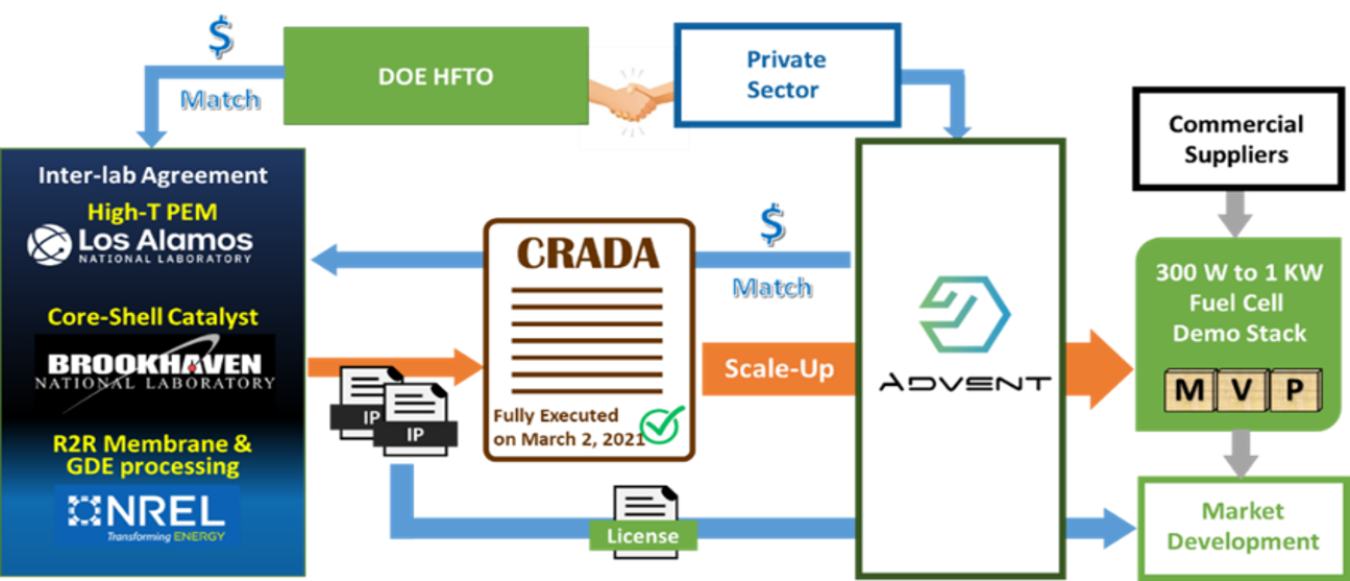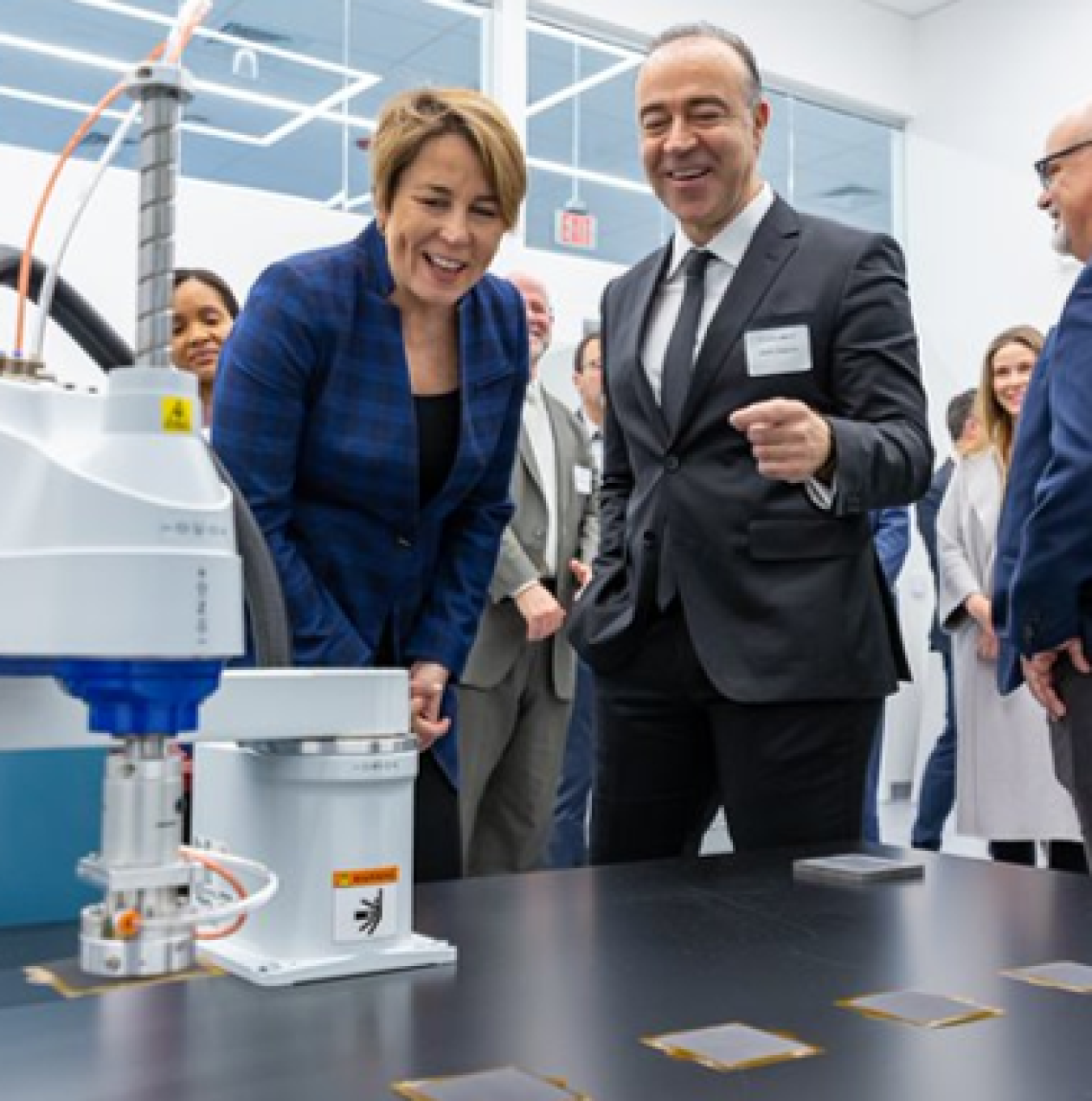The L’Innovator™ Program, run by the U.S. Department of Energy’s (DOE) Hydrogen and Fuel Cell Technologies Office, is helping companies adopt hydrogen fuel cell products developed at the U.S. national laboratories by reducing barriers to implementation.
Hydrogen and Fuel Cell Technologies Office
February 23, 2024The L’Innovator™ Program, run by the U.S. Department of Energy’s (DOE) Hydrogen and Fuel Cell Technologies Office (HFTO), is helping companies adopt hydrogen fuel cell products developed at the U.S. national laboratories by reducing barriers to implementation. The national labs are leaders in the field of hydrogen and fuel cells, with unique expertise and a track record for producing innovative, cost-reducing solutions. Helping industry overcome barriers to implementation for such cutting-edge technologies is a key part of HFTO’s mission.
To help transition these innovative solutions from the laboratory to the marketplace, HFTO launched the L’Innovator program (short for Lab Innovator) in 2017. L’Innovator unites commercial entities and national lab researchers around unique collections of synergistic, lab-generated inventions and other related intellectual property (IP). Dedicated teams turn this IP into demonstration products, called minimally viable products (MVP), then develop manufacturing processes to support commercial viability of the new technology.
HFTO supports this process by providing funding to a team of national labs. This funding acts as a powerful catalyst, serving three vital functions that help the labs to:
- Connect with each other and identify and bundle related IP into packages that can have more potential for commercialization than smaller, individual elements of IP.
- Connect with companies that have the capabilities and market position to successfully commercialize the bundled IP—companies are identified and selected through requests for information.
- Provide technical expertise to improve knowledge transfer from the labs to their industry partners.
In other words, rather than just licensing a single patent, L’Innovator enables national labs to greatly enhance the value of their innovations by bundling technologies across multiple labs and couple them with ongoing support from their own technical experts. In return, their industry partners—who are competitively selected through the request for information process—provide valuable experience, manufacturing capabilities, investment potential, and key knowledge of markets, as well as funding (cost-shared with HFTO) to support the development efforts.
For the participating manufacturing companies and investors, having access to bundled IP through a single point of contact with the labs means a simpler process for locating and engaging with innovators and a streamlined process for licensing and other contractual processes. Demonstrating the new IP in an MVP builds investor confidence and increases the likelihood of the technology gaining a foothold in the booming fuel cell industry. The MVP can then be provided to potential customers early in the development cycle, offering opportunities for independent demonstration and validation of the product’s unique features and benefits.
L’Innovator is a great example of how DOE’s investment in innovative ideas from U.S. national labs can be realized into commercially viable products.
What are the challenges to hydrogen fuel cell innovation?
Hydrogen fuel cells, which convert the energy stored in hydrogen to electricity, are a critical tool for reaching the U.S. goal of net-zero greenhouse gas emissions by 2050. This is particularly true in heavy transportation applications—such as long-haul trucks, marine, off-road, and rail—where other options may face steep challenges. For example, medium- and heavy-duty trucks produce nearly a quarter of the nation’s transportation emissions. In many use cases, hydrogen fuel cells may provide a more economical option than other solutions. Converting these trucks to hydrogen fuel cell–powered vehicles will greatly contribute to curbing U.S. greenhouse gas emissions.
However, hydrogen fuel cells are still too expensive for practical use in many transportation applications. HFTO is funding research, development, and demonstration across academia, industry, and national labs to reduce costs through technical advances; these cost reductions will translate to greater market viability and accelerated adoption and usage.
With decades of experience and hundreds of patents developed, the national labs are established leaders in hydrogen fuel cell innovation. Their full impact, however, can be muted by several factors. One factor is that lab demonstrations of advanced technologies are often insufficient to overcome the commercial risks associated with private sector adoption. For instance, the labs have limited financial resources to cover their time spent engaging with industry—either to identify potential partners or to provide them with ongoing technical support (which can even include experiments to further refine an innovation). Another is that gaining access to a single invention and proving viability can be daunting for a company, let alone accessing many synergistic technologies across multiple labs that could form a transformative new product. This is where the L’Innovator program shines.
“L’Innovator is a great example of how DOE’s investment in innovative ideas from U.S. national labs can be realized into commercially viable products,” said Yu Seung Kim, from Los Alamos National Laboratory.
L’Innovator in action: Advent Technologies unites with national labs
In 2021, the inaugural L’Innovator project partnered Advent Technologies with Los Alamos National Laboratory (LANL), Brookhaven National Laboratory (BNL), and the National Renewable Energy Laboratory (NREL). This project demonstrated L’Innovator’s true value by helping Advent gain the traction needed to produce new commercially viable solutions.

Through the L'Innovator program, Advent and DOE national labs have formed a cooperative research and development agreement (CRADA) to create an MVP from new national lab technologies. The program has helped Advent secure investments that have paved the way for its new manufacturing and R&D facility in Charleston, Massachusetts.
Headquartered in Boston, Massachusetts, Advent is a global player in hydrogen and fuel cell technology. The company was pushing to create a next-generation, high-performance fuel cell suitable for demanding applications, including the heavy-duty transportation market. Through L’Innovator, Advent was able to access a unique bundle of IP for high-temperature proton exchange membrane (HT PEM) fuel cells, and they received support directly from their lab partners to incorporate this IP into a fuel cell that could access new markets.
Advent’s L’Innovator IP bundle includes durable membrane technology from LANL, low-cost and high-performance catalyst technology from BNL, and manufacturing know-how from NREL. With substantial experience in this technology space, Advent applied their expertise in stack and balance-of-plant design, as well as overall system architectures, to transform the labs’ IP bundle into the core of a new HT PEM fuel cell with potential cost and durability advantages over other HT PEM fuel cells. Advent has successfully demonstrated this new technology in an MVP.
L’Innovator not only allows Advent to tap into the technology of some of the country’s leading research institutions, but it also provides the national labs with a mechanism to help Advent adapt the technology to industrial-class processes and meet commercial expectations.
Dr. Emory De Castro, Advent’s Chief Technology Officer, lauded the innovative approach: “L’Innovator has been instrumental in allowing Advent to consider broader markets never thought possible when using the current HT PEM materials.”
Advent generates real-world results
Advent’s novel fuel cell technology has already garnered substantial commercial interest. In 2021, the IP gained from L’Innovator helped Advent raise nearly $160 million in investment capital. As a result, Advent was able to expand its domestic manufacturing capacity and research and development (R&D) capability.

Advent’s Chairman and CEO Dr. Vasilis Gregoriou with Massachusetts Governor Maura Healey during the grand opening of Advent’s new manufacturing and R&D facility.
In April 2023, Advent celebrated the opening of its new manufacturing and R&D facility near Boston, with a tour and celebration that brought together industry, academia, national lab researchers, and government leaders. “This facility is largely centered on advancing the L’Innovator IP platform,” Dr. De Castro noted.
Advent showcased its manufacturing and commercialization prowess with fuel cell products ranging from a small portable battery charger to large-scale power systems. Massachusetts Governor Maura Healey attended the event, along with other state and local officials and business partners. Attendees toured Advent's new facility, which houses state-of-the-art coating machines, an analytics department, fuel cell test stations, and an engineering laboratory for developing next-generation automated assembly processes.
With the new facility, Advent will not only create domestic jobs, but also hands-on learning opportunities for students in the growing fuel cell manufacturing industry, according to a representative of nearby Bunker Hill Community College who attended the event.
Advent and national lab researchers were able to overcome common barriers in the product development cycle and expand domestic manufacturing capabilities. Thanks to the L’Innovator program, Advent’s success—and others to follow—will help strengthen domestic supply chains and drive wider adoption of hydrogen technology.

